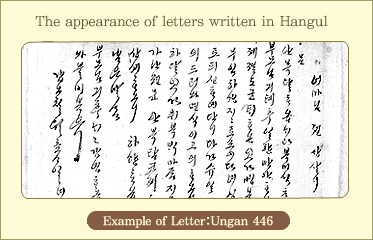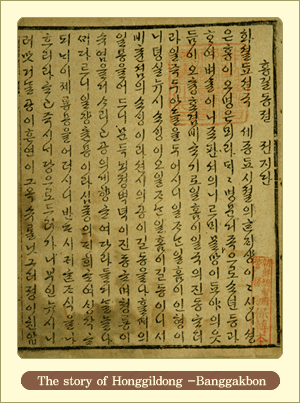| |
| |
 |
|
|
| |

King Sejong's idea of making common people who had no opportunity
of studying Chinese characters literate was very exceptional
and reformative in the social atmosphere at that time, and
it took a long time for the idea to be realized. First of
all, the governing classes still maintained official literary
lives using Chinese characters, and there was very slim chance
for Han-geul to infiltrate through them. Instead, Han-geul
slowly began to expand its influence by playing a role different
from Chinese characters. As Han-geul was invented for common
people, it played an important role among people at first.
Although people who are capable of using Han-geul kept increasing
among the governing classes, they rarely used Han-geul unless
in an exceptional cases because they were using an official,
privileged characters, Chinese characters and Chinese writings.
On the other hand, since common people had no choice, they
gradually started to use Han-geul. The Han-geul message of
King Sunjo shown above implies that Han-geul was widely spread
among common people at that time. There was an event that
shows not only common people but also more and more noble
class people could read and write Han-geul. When a document
written in Han-geul that criticizes the tyranny of Yonsangoon(연산군)
appeared in 1504, Yonsangoon gave an order to ban learning
Han-geul, to burn all the books in Han-geul and to report
all the people who could use Han-geul.
It seems that the person who wrote the document was a noble
man, and he intentionally used Han-geul in order to avoid
exposure of his identity. |
|
 |
|
Women played an immense role in expansion
of Han-geul use. Although many women were taught Chinese writings
in noble classes, it seems that they gradually used Han-geul
much. Therefore, they use Han-geul when exchanging letters
with other women or with men. Also, many books mostly for
women were published in Han-geul. This shows the important
role of women in the expansion of Han-geul use as well. |
 |
|
|
|
|
| |
| |
Secondly, the role
of Buddhism can't be ignored. Although Chosun Dynasty
formally took the policy of respecting Confucianism
and repressing Buddhism, Buddhism still kept an important
position in common people's mind. Especially, the royal
people who led invention and use of Han-geul like King
Sejong and Sejo had strong belief in Buddhism.
Therefore, among many projects that can be done using
Han-geul, they were enthusiastic in promoting translation
and publication of Buddhist scriptures. Although the
vassals made strong protests against their attempts
to build Buddhist temple in the palace in a bid to hold
worship in front of Buddha and publish Buddhist scriptures,
these projects continually lasted throughout the time
of King Sejong, Moonjong, and Sejo. Many Buddhist temples
throughout the country went on publishing Buddhist scriptures
afterward. Its purpose was to let common people realize
the truth of Buddhism and die achieve their religious
goals by reading Buddhist scriptures written in Han-geul.
|
 |
 |
In 17th and 18th century,
novels contributed much in diffusion of Han-geul. Many
people in the governing class were indulged in Chinese
novels at that time. They read not the pure old literatures
but love stories and popular novels and some noble people
who read much of them used similar literary styles in
their own writings as well. (This also gave an excuse
to King Chungjo of enthronement(文體反正)) These novels
were translated in Han-geul and widely read by common
people, too. Han-geul novels were distributed in the
form of transcription at first, but later they were
published in imprinted forms (commercial publication)
due to their commercial values.
These fashion of novels and rise of commercial publications
were a sign of progress toward the modern times. Also,
switching over from the medieval culture of emphasizing
common literary language to the modern culture that
values national language is entangled with it here.
The positioning of Han-geul as a dominant character
of Korea instead of Chinese character meant a progress
towards the modern age.
Han-geul began to be used in official documents of the
country by the Reform in the year of Kabo(갑오개혁), and
the assertion that Korea could grow to a modern and
strong country only if we used Han-geul instead of Chinese
character became powerful. Even though it took a long
time, the idea that King Sejong had in mind when he
invented Han-geul eventually came true. |
 |
|
|
|
|
|
|

